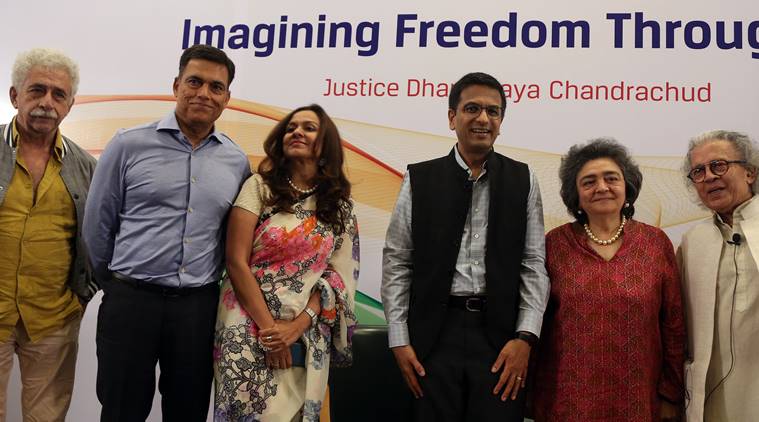
Underlining the importance of art in creating a more inclusive society, Justice D Y Chandrachud on Saturday said, “The freedom for art to expand in all directions is necessary for humanity’s collective progress. The danger lies when freedom is suppressed, whether by the state, by the people or even by art itself. Ironically, a globally networked society has rendered us intolerant of those who do not conform. Freedom has become an avenue to spew venom on those who think, speak, eat, dress and believe differently.”
Delivering the Literature Live Independence Day lecture in Mumbai on ‘Imagining Freedom through Art’, Chandrachud said, “Far more disturbing to my mind is the suppression of art by the state….Whether it be Bandit Queen, whether it be Me Nathuram Godse Boltoy, whether it be Padmaavat or just two months back, Bhobhishyoter Bhoot banned by the West Bengal government because it was a spoof of ghosts among politicians. Politicians were deeply disturbed by the fact that here was this director who had the audacity to talk about the ghosts among politics.”
Justice Chandrachud observed, “Art which challenges the status quo may necessarily appear radical from the view point of the state but that is not a reason to suppress art… We increasingly witness today a world of intolerance, where art is suppressed, defaced, and co-opted. Attacks on art are attacks on freedom itself… Art grants a voice and narrative to oppressed communities, resisting majoritarian hegemony… This is to be cherished and protected,” he said.

Delivering his nearly 50-minute lecture before a room packed with prominent members of the legal, theatre and art fraternity, he said the “lived experiences of oppressed communities” are often excluded from mainstream art. “The threat to restricting art may arise within art itself as a result of dominance of privileged groups over the domain of art and literature… By denying certain communities a voice and a narrative, art can itself be oppressive and enabling of a hegemonic culture,” he said.
“Let’s not forget all art is political. If it were not, art would be merely an ornament of colour, words or music,” he said.
Justice Chandrachud, who was one of the five judges of the Supreme Court who, in a landmark judgment in September 2018, decriminalised homosexuality among consenting adults, also said, “When were hearing the challenge to our earlier verdict on the issue of LGBTQ rights, one of the lawyers mentioned that in the earlier round before the Supreme Court, one of the questions which came from the bench was, ‘Have you ever met somebody who is homosexual?’ We had to right a wrong after several decades.”
Finding mention in Justice Chandrachud’s lecture were, among others, Carnatic musician T M Krishna’s ‘Performing the Periphery’ concert with the transgender community of Jogappas, the Dalit Panther movement, British graffiti artist Banksy, and Chittaprosad Bhattacharya, whose ‘Hungry Bengal’ illustrations in 1943 “highlighted the role of colonial rule and global capitalism in creating a deadly food crisis”.
Later, in a chat with leading corporate lawyer Zia Mody, Justice Chandrachud was asked if a case like the Ayodhya dispute should be before the court. He said, “I will not talk on the merits of the case for the simple reason that I am a part of the bench still hearing the case. But… every citizen has a right to access to justice… a lot of cases which otherwise come to the court – and sometimes you wonder how did this come to the Supreme Court or High Court – are just a part of the process of ensuring access to justice in the widest possible terms.”